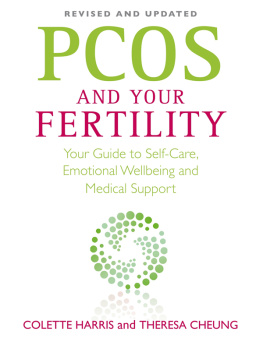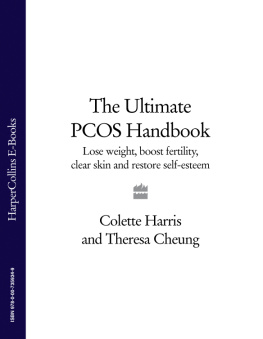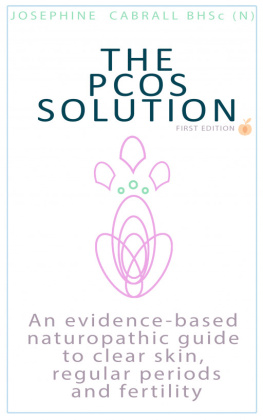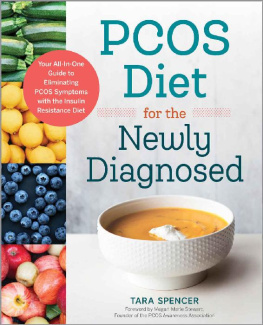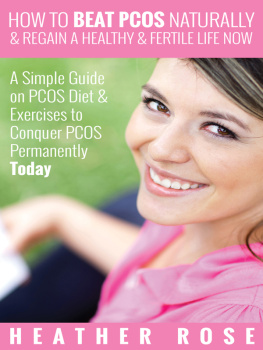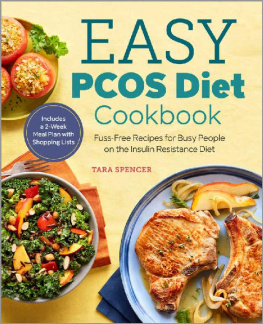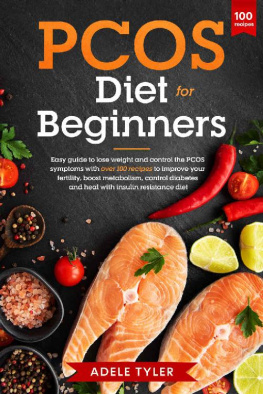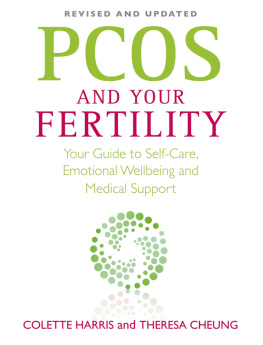
To Verity, the charity for PCOS, for all the good work you do in supporting women with PCOS
ACKNOWLEDGEMENTS
This has been such an important book for me to write as PCOS has become a major problem for many women all around the world and has such an impact on them physically and also psychologically. There is much that can be done to help correct and alleviate the symptoms of PCOS and I am pleased to have the opportunity to share this information here with you.
I would like to thank Liz Gough, my editor and also Cindy Chan and Ali Blackburn at Macmillan, who have been especially helpful in getting this book ready for publication. My thanks also go to Clare Hulton for introducing me to Macmillan and making this book possible.
I am grateful to Louise Atkinson, who has helped to make sure that this book is easy to read and prevented me from getting too bogged down in the medical studies and technical terms.
I would especially like to thank my brilliant team of nutritionists, Alison Belcourt, Helen Heap, Sharon Pitt and Lisa Smith, who work in the London and Tunbridge Wells clinics and who take such good care of our patients. Also to the rest of the team in Tunbridge Wells including Wendy, Brenda, Alex, Gayla, Lee, Dave, Shirley, Felicity and Sarah, who work so diligently behind the scenes making the work I do possible. Thanks also go to my two wonderful nutritionists in Ireland, Heather Leeson and Sally Milne, who are doing a superb job of looking after the women over there.
Special thanks go to all my patients, who have been wonderful in seeking out information on PCOS in order to help themselves. They have shared and talked freely about their symptoms and the impact PCOS has had on their fertility.
Last but not least, my love goes to my family: Kriss, my husband, and my three children Matt (and his wife Hannah and their children Katie and Jack), Len and Chantell (and her partner Phil).
INTRODUCTION
For the past thirty years I have been successfully using natural methods to treat women with a variety of conditions from osteoporosis to hormonal issues such as PMS, irregular, painful and heavy periods, menopause and endometriosis. But some of the most startling and satisfying improvements I have seen have been with women whose lives are blighted by polycystic ovary syndrome (PCOS).
By the time women with PCOS walk through my door they are usually desperate. Many will have tried the various drug options suggested by their doctors, the vast majority will have struggled with diets in a bid to lose weight, but a large number are also depressed and at the end of their tether because they think theyll never be free from the truly horrible symptoms of this condition, or because they face the very real fear that they will never be able to have a baby.
PCOS affects women in so many different ways. In some cases I know exactly whats wrong the moment I see them, while others look completely normal, but inside, their chaotic hormones are wreaking havoc on both their bodies and minds. Invariably, they are miserable, and despairing as to whether they will ever be free from the debilitating symptoms of PCOS.
But after a few tests, some sound advice and a few lifestyle changes, most of the women I see are able to start to turn their lives around. Within three months of following my recommendations, most begin to see positive improvements in their symptoms. Many return for subsequent appointments saying the change is miraculous: their skin problems improve, their unwelcome facial and body hair thins and dwindles and most of them see the beginnings of a regular menstrual cycle.
Many women come to me having been told that PCOS means they may never get pregnant, but I have found, time and time again, that if erratic hormones can be settled naturally, fertility will fall into place. In my experience, PCOS certainly does not mean you cannot have a baby.
WHO AM I?
I am a registered nutritionist and chartered psychologist and a Fellow of The Royal Society of Medicine and have studied and practised nutrition for thirty years, both in the UK and in the USA.
My focus has always been on the natural approach to female hormone problems and, in all my years of practice, I have found that with PCOS, like so many conditions affecting women, the gentle, natural approach works remarkably well.
I believe good diet topped up by supplements and herbs works in harmony with the body, and very often achieves the same effect as drugs, but without any of the potentially negative side effects.
Having said that, many women happily use my recommendations alongside their drug treatments. Sometimes the improvements they feel allow them to reduce the dosages of their drugs (in consultation with their doctor, of course), or even come off them completely.
But in all circumstances, whether you are taking prescription drugs or not, my recommendations will help. In the case of IVF, for instance, they can even boost the effectiveness of the fertility drugs and really can increase your chances of having a baby.
Julies story is very typical of the women I see:
CASE STUDY: JULIES STORY
During my early twenties my periods became quite erratic. While I was at university I put this down to stress, but when I reached thirty I noticed that I was also developing more hair around my chin and inner thighs. I had some acne on my back, which was very unusual, as I had always had such clear skin, and I found I was putting on weight rapidly, particularly around my middle.
I saw my GP who diagnosed PCOS and recommended I go on the Pill to regulate my periods. I was reluctant, and asked for more investigations, but he refused.
I did a bit of research and came across the Dr Marilyn Glenville Clinic and booked an appointment with her. We discussed my diet, which, without me realizing, had become very low in fresh food and contained far too many starchy refined carbohydrates, coffee and sugar these were the foods I had impossible-to-resist cravings for!
She advised that I eat fewer starchy carbohydrates, avoiding them altogether after 6pm, switch to eating plenty of fresh vegetables and protein (fish, eggs, beans, quinoa and nuts and seeds), eliminate or at least reduce my coffee intake to one cup per day and to always have it alongside a meal and not on an empty stomach. She also said that I had to eat every three hours to keep my blood sugar stable, as long gaps would result in fluctuations, which are not conducive to hormonal balance.
She recommended a combination of herbs containing agnus castus, black cohosh and milk thistle to help to lower LH levels (see ), support my liver and, hopefully, regulate my cycle. Alongside this, she suggested a good multivitamin and mineral, a fish-oil supplement and additional chromium and zinc.
Within eight weeks of following the diet I noticed I had more energy, my skin seemed to be clearing and I even had a period!
After sixteen weeks, my cycle had started to regulate and Id lost a significant amount of weight. I was delighted! I had lots of lovely comments from friends and family and this really encouraged me to continue. A year down the line, my hormones are getting back into balance and I now have a regular thirty-two-day cycle. I still have some excess hair, but much lighter in colour so I take this as a very positive sign.
HOW THIS BOOK CAN HELP YOU
I have decided to write this book because my recommendations have helped so many women with PCOS that I now feel really strongly it is time to bring the benefits to women who cant come to see me personally.
If you read this book and take on board my suggestions, you will be doing the best you possibly can to understand PCOS and how it affects you, and you will be able to manage it naturally, with natural solutions that will not do anything to affect adversely the delicate balance of your body.
Next page


